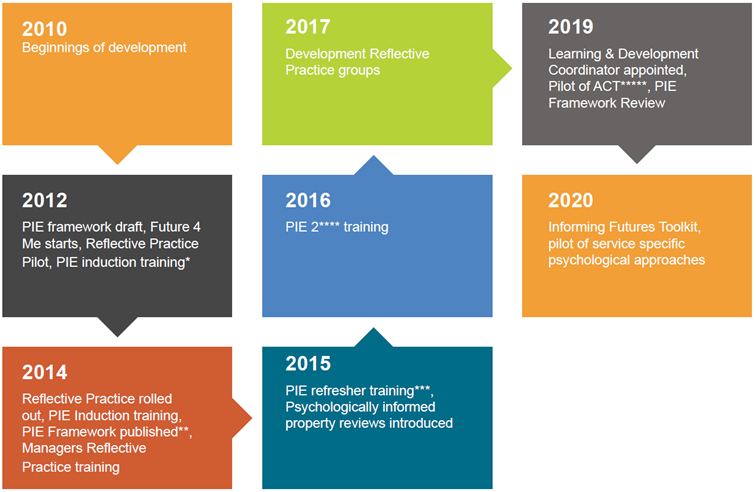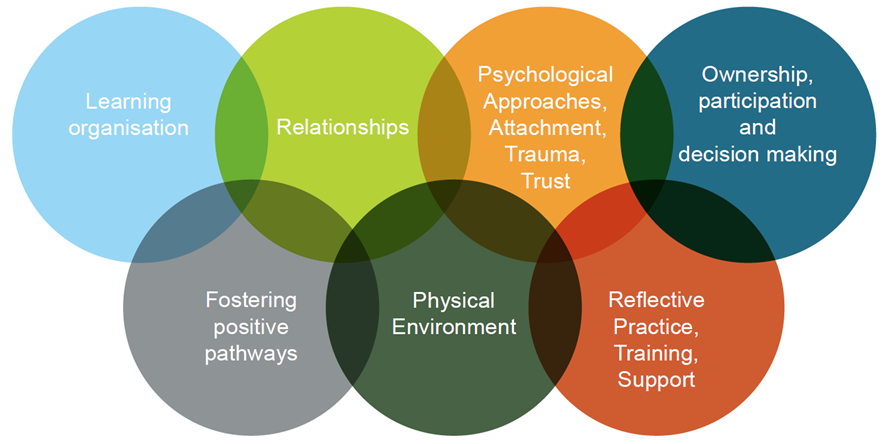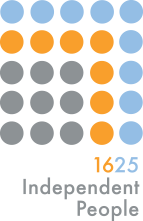1625ip’s PIE story
For the purpose of this guide, we’ve pinpointed 2010 as the start of 1625 Independent People’s (1625ip) PIE journey – but it is important to note that the idea didn’t miraculously appear fully formed one day! 2010 was the year that, as an organisation, we decided to start writing down the PIE principles which were already guiding our work. This developed into a framework over time which continues to be updated on an ongoing basis, as we absorb emerging thinking about best practice.
For us, there were multiple drivers for taking this step. Our leadership identified that PIE provided a practical approach that was responsive to the complex reality of young people’s lives, and supported us to keep young people at the centre of our work. At the same time, there was a growing focus on PIE within local commissioning, in recognition of the fact that PIE provides a collaborative device for effective multi-agency working.
1625ip’s journey, a brief timeline…

- 2010 – Beginnings of development.
- 2012 – PIE framework draft, Future 4 Me starts, Reflective Practice Pilot, PIE induction training*.
- 2014 – Reflective Practice rolled out, PIE Induction training, PIE Framework published**, Managers Reflective Practice training.
- 2015 – PIE refresher training***, Psychologically informed property reviews introduced.
- 2016 – PIE 2**** training.
- 2017 – Development Reflective Practice groups.
- 2019 – Learning & Development Coordinator appointed, Pilot of ACT*****, PIE Framework Review.
- 2020 – Informing Futures Toolkit, pilot of service specific psychological approaches.
* This is induction training for all colleagues that provides a guide to 1625ip’s PIE framework and how this can be applied in our work
*** Training provided to teams offering a ‘refresh’ on specific aspects of 1625ip’s PIE framework
**** Ongoing programme of training throughout the year offering a deeper dive into specific aspects of 1625ip’s PIE framework
***** Piloting of Acceptance and Commitment Therapy as the underpinning approach in our Reboot West programme
A key step in our PIE journey was working out how the five principles of PIE (identified by Robin Johnson et al) applied to our work and our organisation. In making sense of this, we originally (published 2014) identified nine key areas which made sense to us, and in the latest review (2019), revised this to seven key areas.

- Learning organisation – We operate as a learning organisation in which managers, direct colleagues, volunteers and young people are encouraged to value and share a culture of learning and enquiry so, together we can achieve our objectives for young people.
- Relationships – we use relationships with young people to provide the primary “tool for change”.
- Psychological approaches, attachment, trauma, trust – our services are informed by a range of psychological approaches that underpin psychological awareness, central to which is an understanding of how trauma and disruptions to young people’s attachments impact on their lives, their experience and their ability to trust.
- Ownership, participation and decision making – we encourage young people to take ownership of their choices and behaviour and actively participate in decision-making.
- Fostering positive pathways – our services foster positive pathways and spaces for opportunity for each young person, enabling them to develop the potential for a meaningful and fulfilled life.
- Physical environment – our services provide physical environments that support emotional well-being.
- Reflective practice, training, support – all colleagues and volunteers are supported to develop, model and learn from reflective practice, training and support.
These seven principles act as the golden thread which runs through everything we do and help us communicate as an organisation about the way we work. They also interconnect with one another and map to the five key areas of PIE:
- A psychological framework
- Staff training and support
- Relationship building
- Places & spaces
- Evidence generating practice
Resourcing our PIE
The process of organisational change can be complex and requires time and resources. An important step for us was identifying resources – where could we build on the knowledge and skills of current staff? Where did we need to ‘buy in’ additional expertise, or time? What structures could we put in place to capture learning and review progress?
We opted for buying in the support of external psychologists to both guide the development of our PIE framework and to develop and pilot our reflective practice structure. However, for long term sustainability, following the pilot, we implemented a model of peer-facilitated reflective practice. Colleagues undertake a training in facilitation skills and psychological approaches, before being paired with a co-facilitator to facilitate a group that meets every 4 weeks. This requires us to keep training peer facilitators, but creates resilience in the system and provides a development opportunity which can be offered to colleagues whether they work directly with young people or not. This model also provides ‘reflective practice champions’ throughout teams and charity, providing additional support and endorsement for reflective practice in our work.
Reviewing, Learning & Moving Forward
As we’ve learned together over time, it has been important to keep reviewing what our organisation needs.
Developing a PIE is about curating a range of tools and approaches which work for you – there isn’t an ‘off the shelf’ solution. Rather there is a process of trying new things, reviewing effectiveness, and keeping what works. ACT (Acceptance & Commitment Therapy) is an example of a model which has been successful for us in our work with care leavers. We began using it in one specific programme, Reboot West. We’re now starting to apply what we have learned about ACT in different ways across the organisation, offering the training to more staff and using the principles in our colleague wellbeing work. You can read more about our experience of using ACT in this case study of the Reboot West programme.
PIE is now embedded in the language and understanding of our colleagues, from the way we write our recruitment campaigns, to the way we design our services and support our staff. This doesn’t mean we have completed our journey though. By it’s nature, implementing a PIE approach is a job which is never finished. As our organisation develops and changes to better meet the needs of the young people we work with, we need to continue to review our progress, learn from our mistakes, build on our successes and keep moving forward.
You can read more detail about our journey and find pointers and questions for your organisation in the PPT guide to implementing a PIE. You might also want to take a look at our self-assessment tools which can help you get a sense of where your organisation is at today. You can also find more information at PIE Link.
To learn more or find out about various PIE related training we provide, please contact enquiries@1625ip.co.uk.
PIE Resources
If you are reviewing your organisation’s approach or thinking about introducing PIE for the first time, take a look at the links below which offer more detail around creating a PIE framework and rolling it out across your organisation.
Powerpoint
01
Guide to Implementing PIE
Download